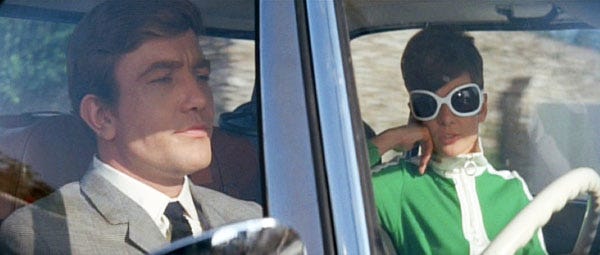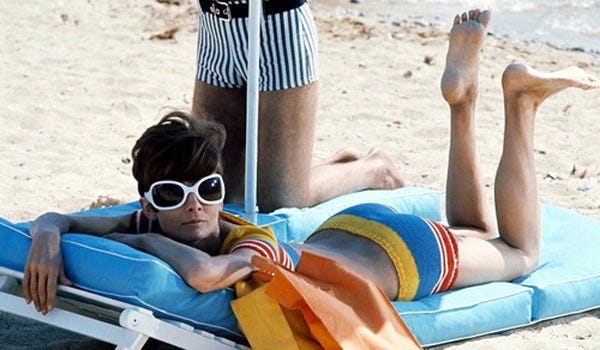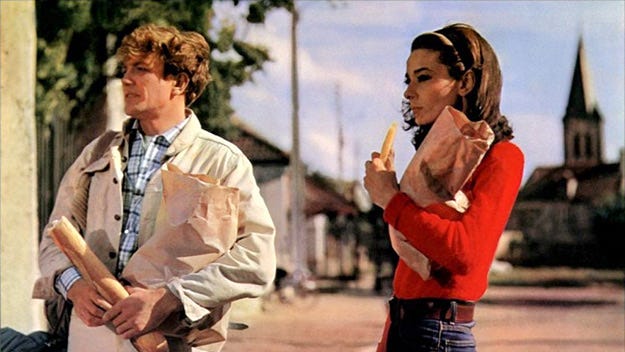Two for the Road (1967)
'Mommy? Do snakes have nipples?'

Before we get into Two for the Road (1967), Stanley Donen’s romantic road-trip, starring Audrey Hepburn and Albert Finney, I need to have my say on music in cinema. It’s incredibly important. Overlooked to some extent, I think, by the intellectual crowd. Take television’s University Challenge. The oh-so-brainy contestants answer questions on the complexities of nuclear fission, the 14th century Avignon Papacy or the capital of Papua New Guinea (as I don’t need to tell you, it’s Port Moresby) with ease, yet remain stumped by the most basic classical music question:
Name the composer of the Nutcracker Suite?
(Excited Voice): Balliol College, Oxford!
‘Er. Mozart?’
No. University of the Thames Estuary?
Er. Um. ‘Rachmaninov?
It’s as if people are musically illiterate. But imagine Gone with the Wind (1939) without Max Steiner’s sweeping theme? Or Dr. No (1962) without Monty Norman’s edgy intro, or, for that matter, Dr Zhivago (1965) without the balalaikas? Or The Pink Panther (1963) without Henry Mancini’s sophisticated, slinky accompaniment? All these fabulous tracks help to make the film. And perhaps more than help. They become the film. They elevate it into something else.
And it’s the same with Two for the Road. Henry Mancini’s lush, melancholy, bittersweet score makes the film. It’s superb. A film about the ups and downs of marriage: ‘marriage is when the woman tells the man to take off his pajamas and it’s because she wants to send them to the laundry.’
Albert Finney plays Mark Wallace, a bluff, impossible, unfaithful, workaholic architect. And arrogant too- which, of course, makes him highly attractive to women. Audrey plays Joanna, Mark’s difficult- yet endearing- wife; she’s demanding and possibly spoilt. From a male point of view- and I feel qualified enough to vouch for that- she’s bloody annoying, but also- curiously appealing, all at the same time. She enjoys the material comforts (a white Mercedes-Benz Pagoda Top, Mary Quant, Space-Age fashion, an architect’s house and all that comes with success); she wants it all- yet resents Mark’s dedication to his work. Which, after all, pays her bills: ‘at least you're not a bad-tempered, disorganised, conceited failure anymore. You're a bad-tempered, disorganised, conceited success.’ ‘Why is it whenever you give a woman everything she wants, you get so bloody minded?’
In many ways they deserve each other; even if thrown together by chance. There’s an early appearance from a young, impossibly desirable and slightly voluptuous Jacqueline Bisset, who’s probably more suited to Mark and his demanding ways, but, alas, as is so often the case in life, fate intervenes, she gets chicken pox and he ends up with kooky, whippet-thin, clingy, bugging, cute Joanna instead. And, of course, the two of ‘em, inevitably, fall for each other. Well they had to, didn’t they?
The script’s by Frederic Raphael (Darling, Far from the Madding Crowd, Oxbridge Blues, Eyes Wide Shut), and it’s marvellously pithy, sophisticated and witty. Full of classic one-liners, worth writing down in your Chatwin-esque Moleskine for future use. And memorable characterisation too: especially the obnoxious Ruthie Bell, the ghastly spoilt brat of an All-American Efficiency Consultant- who might put one off having children for life: ‘Why did Mommy say she (Joanna) was a suburban, English nobody?’ Eleanor Bron, as Ruthie Bell’s mother, Cathy Maxwell-Manchester, is, of course, fabulous, as she always is: ‘She’s gotten this idea that you’re hostile to her. Can I make a suggestion? Why don’t you woo her a little bit?’
Two for the Road is, perhaps, the road movie to end all road movies, intercut between five driving trips across France, spread over twelve years: student hitch-hiking (lorries and farm carts), newly weds (clapped out MG), aspirational young parents (Triumph Herald), on holiday with the Maxwell-Manchesters (American station wagon) and jaded, affluent, argumentative middle aged couple (Mercedes-Benz Pagoda Top); evoking memories of the holidays we’ve had, the holiday we would like to have, or the holiday we would prefer to forget.
From an English point of view, a driving holiday across France (especially in the languid heat of a French August) seems impossibly romantic. I would very much like to hop in the time machine and visit France in that Summer of Love, 1967: the long Roman roads punctuated with poplars, dusty towns with old men playing bowls, pollarded limes, those slightly creepy, deserted hotels (surly, unhelpful Madames who pretend not to understand your schoolboy French) and the ultimate destination at the end of the journey, St Tropez (before the caravan parks and building sites), the glamorous Côte d’Azur and all that comes with it, including an amusing discothèque sequence. Oh, Eurotrash!
Life, of course, depends on random paths and chance encounters, a theme explored in Sliding Doors (1998) and Woody Allen’s Melinda and Melinda (2004), which suits Two for the Road’s rather whimsical French New Wave editing techniques- which, personally, I adore, but despite all the retro fashion appeal, the Paco Rabanne, the cars, the white telephones brought to the table, a modern audience- more accustomed to depressing television drama (‘Cat babe, get out of me life!’) or the thrill, spills and big surround sound of CGI edited blockbusters, might find dated, over stylised or beyond comprehension.
Hepburn and Finney are marvellous. Of course they are. I mean, it’s Audrey Hepburn and Albert Finney. Class acts. Both of ‘em at the top of their game. And there’s a genuine spark, but then, they had an off-screen fling during filming did they not? Finney’s especially good in these Rabelaisian, masculine roles, as with Kingsley Amis’s brash hotelier in The Green Man- made into an excellent television three-parter for the BBC in 1990. And Audrey. Well. Audrey’s just Audrey. What can I say? Two for the Road is one of my favourite films; a Film for Grown Ups. It’s funny, sad, romantic, subtle, witty and literate. And rather human. I watched it again last night, for the umpteenth time, and suddenly realised that despite the bleakness of their marriage (‘Bitch… Bastard…’) they do like each other. And in some ways they are suited to each other- even if, at the same time, they’re not. Because, folks- marriage: it ain’t easy.
Two for the Road (1967) is available to watch on Amazon Prime Video instant download and on DVD and Blu-Ray.
You've just been reading a newsletter for both free and 'paid-for' subscribers. I hope you enjoyed it. A BIG thank you to all those of you who have signed up. We’re motoring. Now over 150 subscribers in our first month.
Two options: the Friday morning newsletter will be available on a ‘paid-for’ subscription with a 7-day free trial- which will also give you full access to the Luke Honey WEEKEND FLICKS. archive. Over time, this should build up into a considerable resource.
And there’s now a second newsletter for both free and paid-for subscribers (i.e. everybody), which- inshallah- I'll be posting every Sunday morning, alongside a strong cup of black coffee- and hopefully- a generous dose of dawn inspiration. So take your pick. Either subscription’s a good bet.
So tune in for next weekend’s film recommendations. No idea what that’s going to be. Need to get my thinking cap on.
In the meantime, have a relaxing and cinematic Sunday…











Love this one too, I only watched it last year - love how avant garde the fashion was for Audrey too, broke her out of the classic style that was expected of her.
A personal favorite as well, I’m afraid that movies like this made youthful me a sucker for any girl who reminded me of Audrey Hepburn - then there’s the idea of a road trip in a fun to drive two seater (never appreciated muscle cars compared to something light and agile). Great descriptions of a classic film.